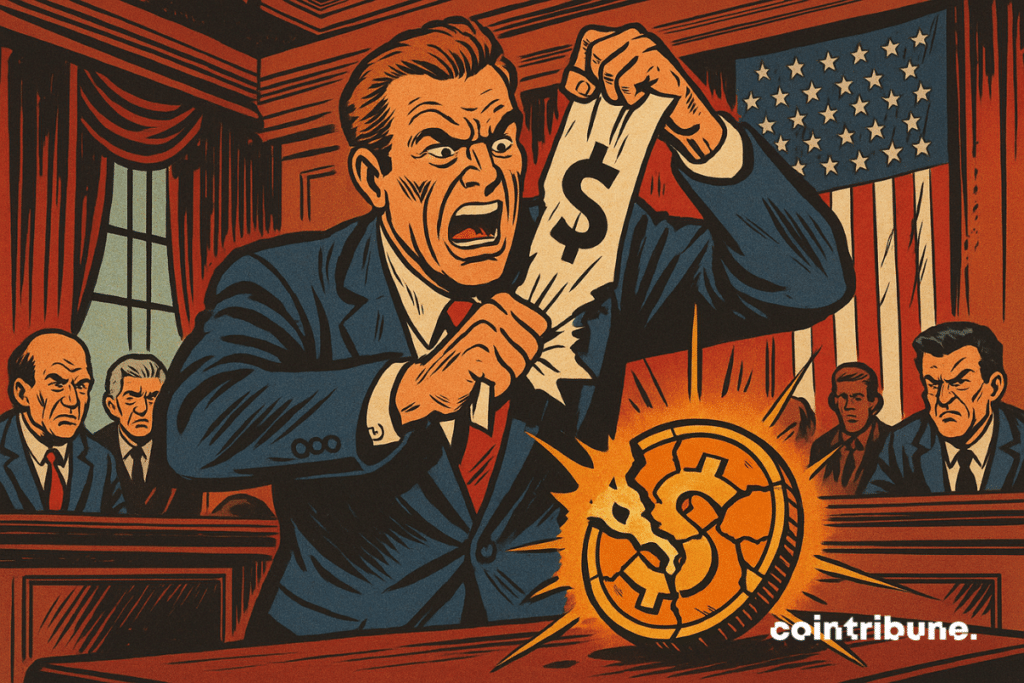21h05 ▪
4
min read ▪ by
The US Senate rejected yesterday the GENIUS Act bill aimed at regulating stablecoins. With a vote of 48 against 49, far from the 60 votes needed, this bipartisan legislation faced unexpected opposition from Democrats, jeopardizing the regulatory future of dollar-backed cryptos. But what are the real reasons behind this legislative failure?


In brief
- The GENIUS Act bill failed with a vote of 48 against 49, far from the 60 votes needed.
- Democrats withdrew their support, citing concerns about Trump’s ties to the crypto sector.
- Senate Majority Leader John Thune changed his vote to allow for a later reconsideration.
- Republicans accuse Democrats of jeopardizing the future of the American crypto industry.
Why did the Democrats block the stablecoin bill?
The US bill on stablecoins suffered a harsh defeat in the Senate on Thursday, May 8. The GENIUS Act legislation failed to clear the crucial procedural hurdle that would have allowed it to be debated in a plenary session, halted abruptly by Democratic resistance that few had anticipated.
With 48 votes for and 49 against, the vote ended well below the 60 votes required to advance the bill. Notably, two Republicans, Josh Hawley and Rand Paul, joined the opposition, further weakening this legislative initiative.
The turnaround by several Democrats, who were initially supportive, surprised observers. These senators now denounce the lack of strong safeguards against fraudulent activities that stablecoins could facilitate.
Their main concern? The business relationships President Trump maintains with the crypto industry, seen as a troubling conflict of interest.
Even Senator Ruben Gallego, who received 10 million dollars in support from crypto lobbies during his 2024 electoral campaign, defended this change of heart:
Legislation of such importance cannot be rushed. We need time to properly review it.
He recommends at least a delay until next Monday to allow a more thorough evaluation of the bill.
Republicans denounce an unjustified blockage
Republican Senator Bill Hagerty, the main architect of the bill, did not mince his words in the face of this setback.
For him, the lawmakers who blocked the opening of the debate effectively voted to “kill the crypto industry in America.” An accusation highlighting the scale of political differences on this sensitive issue.
John Thune, Senate Majority Leader, defended the inclusive nature of the legislative process: “This is a bipartisan bill, developed in a spirit of collaboration from the start.“
He emphasized that the current bill already represents the sixth version, after multiple revisions to address Democratic concerns. “I really do not understand their current position“, he added.
Beyond partisan considerations, the GENIUS Act pursued a major strategic goal: to reinforce the dominance of the US dollar on the international stage through stablecoins. The Trump administration sees it as a crucial geopolitical lever to maintain the greenback’s hegemony in the global digital economy.
The question remains: will a revised version of the bill emerge quickly from negotiations? The timeline set by President Trump is ambitious, aiming for a signature before the parliamentary recess in August. The future of crypto regulation in the US, and potentially the influence of the dollar in the global digital economy, now depend on these upcoming negotiations.
Maximize your Cointribune experience with our “Read to Earn” program! For every article you read, earn points and access exclusive rewards. Sign up now and start earning benefits.
Passionné par le Bitcoin, j’aime explorer les méandres de la blockchain et des cryptos et je partage mes découvertes avec la communauté. Mon rêve est de vivre dans un monde où la vie privée et la liberté financière sont garanties pour tous, et je crois fermement que Bitcoin est l’outil qui peut rendre cela possible.
DISCLAIMER
The views, thoughts, and opinions expressed in this article belong solely to the author, and should not be taken as investment advice. Do your own research before taking any investment decisions.

